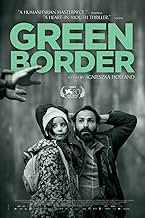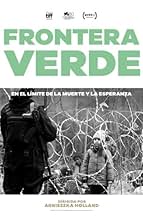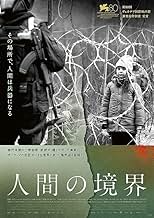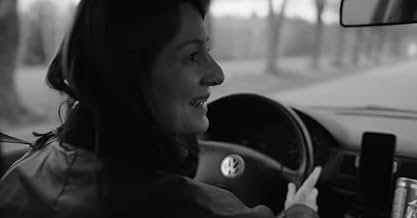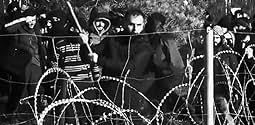VALUTAZIONE IMDb
6,4/10
7385
LA TUA VALUTAZIONE
Segui una famiglia di rifugiati siriani, un insegnante di inglese dall'Afghanistan e una guardia di frontiera, quando si incontrano tutti al confine polacco-bielorusso durante l'ultima crisi... Leggi tuttoSegui una famiglia di rifugiati siriani, un insegnante di inglese dall'Afghanistan e una guardia di frontiera, quando si incontrano tutti al confine polacco-bielorusso durante l'ultima crisi umanitaria in Bielorussia.Segui una famiglia di rifugiati siriani, un insegnante di inglese dall'Afghanistan e una guardia di frontiera, quando si incontrano tutti al confine polacco-bielorusso durante l'ultima crisi umanitaria in Bielorussia.
- Regia
- Sceneggiatura
- Star
- Premi
- 30 vittorie e 32 candidature totali
Behi Djanati Atai
- Leïla
- (as Behi Djanati Ataï)
Muhammad Al Rashi
- Grandpa
- (as Al Rashi Mohamad)
Michal Zielinski
- Sasza
- (as Michael Zielinski)
6,47.3K
Attività insolita
Our rating mechanism has detected unusual voting activity on this title. To preserve the reliability of our rating system, an alternate weighting calculation has been applied.
Recensioni in evidenza
"Green border" shows immigration from a different perspective than is slowly becoming mainstream in Europe, being it Poland (the land in which the film is situated), Holland (in which the anti-immagration party PVV won the election of november 2023) or England (that want to send refugees to Rwanda).
The situation on the Eastern border of Poland is different in this respect that the Belarus of Lukashenko uses refugees as a weapon against the European Union (EU). They lure refugees to Belarus with the promise that the transit to the EU (i.e. Poland) is without any difficulty, which of course is not the case.
"Green border" is a documentary like film that shows the story from different perspectives. These perspectives are those of a Syrian family, Polish border guards and Polish activists.
The episodes about the Syrian family and the border guards are heavy stuf and the episode about the Polish activists is desperately needed to bring back some confidence in humanity.
The conservative Polish government was very angry about the movie and even called director Agnieszka Holland a Nazi. This is of course ridiculous. The anger was most probably directed against the episode about the Polish border guards, but even these episode is not totally negative as its shows that the border guard these episode is about has increasing psychological difficulties with the job he is doing (pushing back refugees to Belarus). The episode is indeed very critical about his superior, telling the border guards that the refugees are not human beings but bullets fired by Lukashenko.
One perspective that is missing is the Belarussian one. One can criticize the harsh behaviour of the Polish border guards but there can be no doubt abourt the fact that Belarus started using the refugees as pawns in a cynical political power struggle.
Also from Western Europe we have to be carefull with too much criticism. The push backs on land by the Polish border guards are illegal, but what about the push backs on sea by Frontex? Moreover, we have easy talk, not bordering on a cynical regime like that of Lukashenko.
Images say more than 1000 words and in this respect the film is in my opinion a must see for those who want to understand more about the immagration crisis. In the Netherlands I had the feeling that the film was in roulation very short. I had to hurry to visit the last performance and was accompanied by only one fellow visitor.
To conclude one point of critic. In the epilogue the film shows how welcome Ukrainian refugees were when in february 2022 their country was invaded by Russia, strongly suggesting that there is a racist element in which refugeest are being supported and which not. I would like to qualify this suggestion. In the first place the aggressor in the Ukranian war is also a threat to Poland, unlike the aggressors in the other conflicts generating refugees (such as Assad in Syria). In the second place has the loyalty with Ukraine cooled down considerably (not in words but in deeds) after two years of war.
The situation on the Eastern border of Poland is different in this respect that the Belarus of Lukashenko uses refugees as a weapon against the European Union (EU). They lure refugees to Belarus with the promise that the transit to the EU (i.e. Poland) is without any difficulty, which of course is not the case.
"Green border" is a documentary like film that shows the story from different perspectives. These perspectives are those of a Syrian family, Polish border guards and Polish activists.
The episodes about the Syrian family and the border guards are heavy stuf and the episode about the Polish activists is desperately needed to bring back some confidence in humanity.
The conservative Polish government was very angry about the movie and even called director Agnieszka Holland a Nazi. This is of course ridiculous. The anger was most probably directed against the episode about the Polish border guards, but even these episode is not totally negative as its shows that the border guard these episode is about has increasing psychological difficulties with the job he is doing (pushing back refugees to Belarus). The episode is indeed very critical about his superior, telling the border guards that the refugees are not human beings but bullets fired by Lukashenko.
One perspective that is missing is the Belarussian one. One can criticize the harsh behaviour of the Polish border guards but there can be no doubt abourt the fact that Belarus started using the refugees as pawns in a cynical political power struggle.
Also from Western Europe we have to be carefull with too much criticism. The push backs on land by the Polish border guards are illegal, but what about the push backs on sea by Frontex? Moreover, we have easy talk, not bordering on a cynical regime like that of Lukashenko.
Images say more than 1000 words and in this respect the film is in my opinion a must see for those who want to understand more about the immagration crisis. In the Netherlands I had the feeling that the film was in roulation very short. I had to hurry to visit the last performance and was accompanied by only one fellow visitor.
To conclude one point of critic. In the epilogue the film shows how welcome Ukrainian refugees were when in february 2022 their country was invaded by Russia, strongly suggesting that there is a racist element in which refugeest are being supported and which not. I would like to qualify this suggestion. In the first place the aggressor in the Ukranian war is also a threat to Poland, unlike the aggressors in the other conflicts generating refugees (such as Assad in Syria). In the second place has the loyalty with Ukraine cooled down considerably (not in words but in deeds) after two years of war.
Even before the premiere of this movie, there was a lot of drama going on already. Everyone was reviewing it even though all they saw was a tiny bit of trailer. Sometimes, not even that. Even polish government started to make their own propaganda to make people believe it was anti-polish movie and all of that just so they could gain more voters before election that will happen soon. In some cities, it's even banned to be played in cinemas. That's how current government's world works and will work if they win again. No free speech, full censorship of anything that may be offensive towards government and many many more. But it's not about it.
Movie itself is build on politics, so it's hard to not talk about them. Though, I don't think that Holland wanted to attack the army itself, as some of the people think she did, but rather the corruption and how government overused their power. How they forced people to act like there was no human rights, like those people on the other side of the fence were nothing. This movie isn't about letting illegal migrants into the country, but about respect and right treating. We're all humans after all, but what was happening on the border was really wrong.
It's not a documentary, but a lot of things that happened in the movie had place in real life. There was a lot of videos, photos and even articles saying about those horrible things happening. And all of it just because of the government, who wants to make their own people scare and be afraid of other nationalities. Movie was also about our own feelings, how we see the world that surrounds us. It's always hard to say about things, that are uncomfortable, but true. But they have to be said and we can't just let those high positioned people get away with it without any consequences. That's not how this world should work.
I was following the news back then and I'm really glad that such movie was made and is showing somehow the reality of what was happening on the border. But the truth is, what media were allowed to show us and what is the real truth of how it really looked like, is two different things and for people, who are open-minded those two things should matter to draw your own conclusions and based on that make your own opinion.
Movie itself is build on politics, so it's hard to not talk about them. Though, I don't think that Holland wanted to attack the army itself, as some of the people think she did, but rather the corruption and how government overused their power. How they forced people to act like there was no human rights, like those people on the other side of the fence were nothing. This movie isn't about letting illegal migrants into the country, but about respect and right treating. We're all humans after all, but what was happening on the border was really wrong.
It's not a documentary, but a lot of things that happened in the movie had place in real life. There was a lot of videos, photos and even articles saying about those horrible things happening. And all of it just because of the government, who wants to make their own people scare and be afraid of other nationalities. Movie was also about our own feelings, how we see the world that surrounds us. It's always hard to say about things, that are uncomfortable, but true. But they have to be said and we can't just let those high positioned people get away with it without any consequences. That's not how this world should work.
I was following the news back then and I'm really glad that such movie was made and is showing somehow the reality of what was happening on the border. But the truth is, what media were allowed to show us and what is the real truth of how it really looked like, is two different things and for people, who are open-minded those two things should matter to draw your own conclusions and based on that make your own opinion.
I won't deny that I was prompted to watch the film right after the Polish premiere by how extremists in the government try to use it to their advantage by throwing around statements that are subject to Godwin's law in normal discourse, which at the same time obscures the message and power of the picture. The second reason was my interest in the subject matter covered - for the past two years I have been hearing about the events that have been fictionalized in this powerful and emotionally stirring film. The situation in Ukraine, Belarus, the constant information war and disinformation on the part of Belarus and Russia, the visa scandal in which the government is involved, the dying refugees in the border area between Poland and Belarus.
The visual layer of the film is flawless. The story is told in an intriguing, engaging way, and there are several memorable moments, including some dialogues that, curiously enough, show the surprising self-irony of the middle class supporting the neoliberal opposition. The script and acting were not always flawless, although this did not detract too much from the overall reception of the film, as the film defends itself primarily through its imagery. It is truly unforgettable. I recommend it from the bottom of my heart.
The visual layer of the film is flawless. The story is told in an intriguing, engaging way, and there are several memorable moments, including some dialogues that, curiously enough, show the surprising self-irony of the middle class supporting the neoliberal opposition. The script and acting were not always flawless, although this did not detract too much from the overall reception of the film, as the film defends itself primarily through its imagery. It is truly unforgettable. I recommend it from the bottom of my heart.
Polish director Agnieszka Holland's impassioned examination of the European refugee crisis from her nation's perspective. Holland's film, which she also co-wrote, is a sprawling work which begins by following a family of Syrians who are trying to the EU through Russian dominated Belarus. From there, the movie weaves it way to the Border Guards and, eventually, ia small band of mostly female Aid workers who give medical and legal assistance to the immigrants.
The structure is a bit daunting even though there are loose connections binding it all together. Cinematographer Tomasz Naumiuk shoots in an austere Black and White with Frédéric Vercheval's brooding score as accompaniment. The large cast is quite good with Maja Ostarszewska a standout as the, perhaps a bit naive Julia, one of the Polish volunteers. Behi Djanati Atai is memorable as a defiant Afghan woman who crosses the border with the Syrians. What knits it together is Holland's vision, which becomes clearer and clearer as the various strands are brought together - while simulataneously being torn assunder.
Holland never flinches from the painful and graphic details of the refugees' plight. They are literal political footballs booted from one side of the border to the other. There are times when the structure doesn't completely work and the filmmaker does dwell a bit on some seemingly extraneous details, but, there is no questioning Holland's fervor - much of it directed at Poland's leadership. It's been a highly controversial film within the nation and its government, and throughout much of Europe.
Unsurprisingly, it was NOT Poland's official submission to this past year's Academy Awards.
At 75, Holland (an Oscar nominee for EUROPA EUROPA) has made a daring - some would say angry - film. A stunning work of art that demands to be seen.
The structure is a bit daunting even though there are loose connections binding it all together. Cinematographer Tomasz Naumiuk shoots in an austere Black and White with Frédéric Vercheval's brooding score as accompaniment. The large cast is quite good with Maja Ostarszewska a standout as the, perhaps a bit naive Julia, one of the Polish volunteers. Behi Djanati Atai is memorable as a defiant Afghan woman who crosses the border with the Syrians. What knits it together is Holland's vision, which becomes clearer and clearer as the various strands are brought together - while simulataneously being torn assunder.
Holland never flinches from the painful and graphic details of the refugees' plight. They are literal political footballs booted from one side of the border to the other. There are times when the structure doesn't completely work and the filmmaker does dwell a bit on some seemingly extraneous details, but, there is no questioning Holland's fervor - much of it directed at Poland's leadership. It's been a highly controversial film within the nation and its government, and throughout much of Europe.
Unsurprisingly, it was NOT Poland's official submission to this past year's Academy Awards.
At 75, Holland (an Oscar nominee for EUROPA EUROPA) has made a daring - some would say angry - film. A stunning work of art that demands to be seen.
I loved the different perspectives this movie shown, at first tho i was scared that they would show all guards and people there as bad ones. It is not all black and white like that. There was some things that this movie omitted, but i think the message still is valid. We should all be treated in humanly way, you know. As a sensitive person this movie hit me hard, the pregnant woman scene, like WHO can be heartless like that. I am also big fan of french music, so i loved 'Mourir mille fois' in the soundtrack. Anyway, if u think about watching this movie, than i think its a great way of spending sad autumn afternoon. For sure you will think about this movie for a while. ( If you dont find feelings, emotions etc. Interesting than maybe dont go, cos you will not get the point and probably you'll be bored). Have a nice day people :)
Lo sapevi?
- QuizAt 00:11:12, a refugee checks their location using an OpenStreetMap-based map on a smartphone. The location shown is the Poland-Belarus border at 52.61281 23.74398.
I più visti
Accedi per valutare e creare un elenco di titoli salvati per ottenere consigli personalizzati
- How long is Green Border?Powered by Alexa
Dettagli
Botteghino
- Lordo Stati Uniti e Canada
- 96.595 USD
- Fine settimana di apertura Stati Uniti e Canada
- 7305 USD
- 23 giu 2024
- Lordo in tutto il mondo
- 4.240.827 USD
- Tempo di esecuzione2 ore 32 minuti
- Colore
Contribuisci a questa pagina
Suggerisci una modifica o aggiungi i contenuti mancanti





